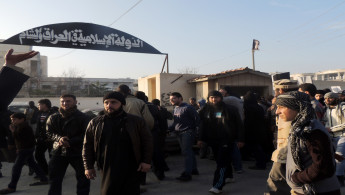Jihadis' 'unrecognised' children left behind in Syria and Iraq
The Jordanian authorities have either failed to notice - or intentionally ignored - the facts regarding more than 3,000 Jordanian Salafi jihadis who have joined up with al-Nusra Front and the Islamic State group (IS, formerly known as ISIS).
The government refuses to acknowledge Jordanians killed in the fighting in Iraq and Syria. According to state records, the dead are still alive and the married remain single, their children undocumented. Those children have become a new generation of the bidoon ["the withouts"], inheriting the title from the stateless of Kuwait.
Living dead
Over the past three years, Jordanian Salafis have infiltrated Syria illegally, sometimes over the Jordanian border and other times via Turkey. The Jordanian government has always denied it "facilitates the passage of terrorists". Indeed, the borders are tightly controlled to intercept potential infiltrators and refer them to the State Security Court, where they tend to receive prison sentences.
But the government has ignored its legal obligations regarding those Jordanians who have managed to join the fray. Salafi groups revealed no fewer than 250 Jordanian nationals had been killed in battle, but according to Amman, all these fighters are still alive - although their families are struggling to prove otherwise.
Mahmoud Abdelal, a Salafi jihadi, was killed in the city of Daraa in October 2012, after he joined up with the al-Nusra Front - al-Qaeda's Syrian franchise - to fight President Bashar al-Assad's regime. His family is one of hundreds in Jordan that are suffering because their sons are registered as alive in the records of the Civil Status and Passports Department (CSPD), which records all births and deaths.
| Many of those engaged in jihad for years have got married, and many have had children. |
"All our attempts to prove that Mahmoud is dead ended in failure," said Mahmoud's father, 54-year-old Mohammad Tawfiq Abdelal.
The bereaved parent asked the CSPD to issue a death certificate for his son days after he found out his child had been killed. He took with him a copy of the newspaper that reported Mahmoud's death, and an official letter signed by a number of witnesses.
The CSPD wanted an official medical report confirming Mahmoud's death - an almost impossible request given the circumstances - and refused to issue a death certificate.
Mahmoud, killed at the age of 33, is survived by a wife and five children, but despite an offer of marriage that could help support the children, Mahmoud's wife cannot remarry because she is neither a widow nor divorced according to the CSPD records.
Mahmoud's mother, 52-year-old Hind Hasan, revealed that her dead son's family is trapped in a bureaucratic nightmare.
"When we tried to get some official documents related to the children processed, the CSPD asked that the father be present," she said. "When we explained that he was dead, they asked for the death certificate."
Worse still, charitable organisations that care for orphans also demand proof of parents' death.
The family of Yousef Taysir Saadeh may be about to endure quite an ordeal. Saadeh was a Salafi fighter, killed in early August 2014 in the city of Mosul where he had joined the ranks of the Islamic State group.
His family, who are caring for his wife and two-year old daughter, have so far not attempted to get a death certificate after being told by a CSPD officer that it would be impossible.
The law
Malek al-Khasawneh, a CSPD spokesman, told al-Araby al-Jadeed that it is mandatory to record all births and deaths that take place outside Jordan - on the condition that they are regulated according to the laws of the foreign state.
Recording a death that takes place outside Jordan requires an official notification from the country where it occurred, and if this is impossible within a year, the law authorises the Court of First Instance to investigate and potentially confirm the death.
Another course of action, according to Mahmoud Badawi, a professor of Islamic law, is to file a lawsuit with the Sharia judiciary to confirm the death.
But the procedures are difficult. Families can confirm death through written evidence, which means official letters from government institutions, chiefly the intelligence services, the prison administration, and hospitals.
The death of a person who went to a warzone can be proved only after one full year from the date they went missing, or four years after their absence if he went to a safe country.
Undocumented children
| It is difficult for the wife to prove marriage, and even then it is difficult for her to come to Jordan to initiate legal action. |
Another bureaucratic tragedy is the fate of children of born to Jordanian Salafis who married on the battlefield. A prominent Salafi fighter, who refused to be named, told al-Araby al-Jadeed that many of those engaged in jihad for years have got married, and many have had children.
In the absence of official statistics on the number of married Jordanian fighters in Iraq or Syria, it is impossible to know how many children have been left disenfranchised, stateless.
Although there is a potential legal channel to prove marriage, blood relations, and ultimately citizenship, it is practically impossible and would take years.
Hadeel Abdelaziz, executive director of the Justice Centre for Legal Aid, is concerned that the children of Jordanian fighters in Syria - especially those whose fathers were killed - might become bidoon.
It is difficult for the wife to prove marriage, and even then it is difficult for her to come to Jordan to initiate legal action.
Jordanian authorities must implement a transitional justice law, said Abdelaziz, to prove the death of these Jordanians abroad, and formalise their marriages and the birth of their children.
This is an edited translation from our Arabic edition.



